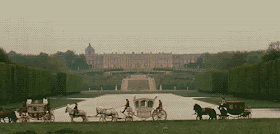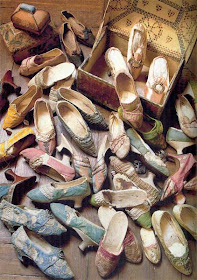I just finished reading To The Scaffold: The Life of Marie Antoinette by Carolly Erickson. One of history's most misunderstood figures, she continues to symbolize the glamorous, the extravagant and the decadence of French society before the revolution. Yet this account gives us a likable, empathetic woman and broadens our understanding of her. I know this is a decorating blog but I want to step outside of my normal posts and do something a bit different. While I am still in the mood for more of Marie, I thought a post about her life at court would be fun. Hope you enjoy!
This is an automaton made for the Queen that plays the harpsichord.
Now listen as you pay a visit to the Court of France
google.com
Chateau Versailles
The Château de Versailles is one of the most beautiful achievements of 18th-century French art. The site began as Louis XIII’s hunting lodge before his son Louis XIV transformed and expanded it, moving the court and government of France to Versailles in 1682. Each of the three French kings who lived there until the French Revolution added improvements to make it more beautiful.
google.com
A young Maria Antonia Josephina Johanna
partytights.com
Enjoy your view of life at court.
tumblr.com
lovelornhymn.tumblr.com
Louis XVI and Marie Antoinette.
viaeuropatranslados.files.wordpress.com
The Hall of Mirrors. The Grande Galerie (La Grande Galerie in French), as it was called in the 17th century, served daily as a passageway and a waiting and meeting place, frequented by courtiers and the visiting public.
The antique key to Chateau Versailles
The chamber is the main room of the apartment, the one where the Queen spent most of her time. She slept here, often joined by the King. In the morning, she received here during and after her Toilette
When the palace was invaded by the rioters on 6 October 1789, Marie-Antoinette managed to escape from them through this little door onto a corridor which gave access to the Queen’s internal apartments, a dozen small rooms reserved for her private life and her servants.
google.com
Marie Antoinette's writing desk. A gift for her 29th birthday.
flickr.com
Her fan
Profile medallion of Marie Antoinette as Dauphine of France in 1770, prior to her marriage.
en.chateauversailles.fr
The Cabinet of the Meridian The particular shape of this boudoir, with its cut sides, made it possible for the queen’s domestic servants to pass from the large bedchamber to the other chambers without disturbing the queen who, at midday, would go and rest there, hence the name Meridian.
Marie Antoinette's shoes at auction.
marieantoinettequeenoffrance.org
One of Marie Antoinette’s shoes, originally lost when the Queen and royal family fled the Tuileries when it was stormed in 1792, along with embroidered garters once belonging to Marie, and embroidered bonnet once belonging to her daughter, Marie Therese.
The Queen and her children.
commons.wikimedia.org
Madame Royale and her younger brother Louis Joseph Xavier of France, Dauphin of France. I have a large needlepoint picture of this that I bought in England. It came from on old farm house and the new owners were "getting rid" of things left by previous owners. I had no idea who these people were until I started working on this post. Needless to say it was a pleasant surprise. You can see it below.
tumblr.com
It is believed now that Marie never said the phrase "let them eat cake". It is now believed a similar phrase was attributed to the queen of Louis XIV, Maria Theresa of Spain,who hearing one day the poor people pitied for being in want of bread, replied, "But, dear me, why do they not eat pie-crust?"
labelleotero.tumblr.com
Carriage used by the children of Marie-Antoinette.
houseofversailles.tumblr.com
Her monogrammed handkerchief
google.com
Le Petite Trianon
It was designed by Ange-Jacques Gabriel by the order of Louis XV for his long-term mistress, Madame de Pompadour, and was constructed between 1762 and 1768. But Madame de Pompadour died four years before its completion, and it was subsequently occupied by her successor, Madame du Barry. Upon his accession to the throne in 1774, the 20-year-old Louis XVI gave the château and its surrounding park to his 19-year-old Queen Marie Antoinette for her exclusive use and enjoyment. Marie longed to escape Louis and his court, and he gave her just the place.
The French Pavilion, used to host intimate garden parties
google.com
The Queen's Hamlet.
google.com
She loved this place where she could return to the pleasures of simple, rural pursuits, away from the pomp of Versailles.On the right, the Queen’s House itself, the ground floor comprised of a dining room and a games room, while the first floor was made up of a large living room, a small living room and a Chinese room; on the left, the Billiard Room, the ground floor comprised of a billiard room, and a private apartment on the first floor. From the top of the gallery, the lady of Trianon, wearing a simple white muslin dress and a straw hat, could oversee the work being done in the fields.
labelleotero.tumblr.com
Marie Antoinette's wedding carriage.
images.search.yahoo.com
Marie-Antoinette’s Harp Music was Marie Antoinette's passion and she had great talent. She could read music, sing & play the clavichord. The harp was her favorite instrument and her teacher was the gifted Philippe Joseph Hinner. This harp was made by Jean-Henri Naderman, luthier and harp-maker to the Queen, and was delivered in November, 1774. It is decorated with lilies & a cherub bearing the Queen’s arms. The sound board has paintings of Peace & Minerva, patroness of artists
madameguillotine.org.uk
flickr.com
A lock
of Marie Antoinette's hair.
hyperphysics.phy-astr.gsu.edu
The Marie Antoinette diamonds, said to be a gift from her husband, King Louis XVI. According to one legend, she had them with her when she was arrested fleeing the French Revolution in 1791.
Marie Antoinette's coffer.
leahmariebrownhistoricals.blogspot.com
theloveforhistory.wordpress.com
Surviving chemise worn by Marie Antoinette while in prison.
leahmariebrownhistoricals.blogspot.com
Her last journal entry on Oct 16, the day of her execution at 4: 30 in the morning says "My God have mercy. I have no more tears to cry for you my poor children; farewell, farewell
A tragic figure: Marie Antoinette in her final days.
leahmariebrownhistoricals.blogspot.com
leahmariebrownhistoricals.blogspot.com
Marie Antoinette is buried here in the crypt of the Basilica of St. Denis.















.jpg)






















.jpg)


.jpg)


